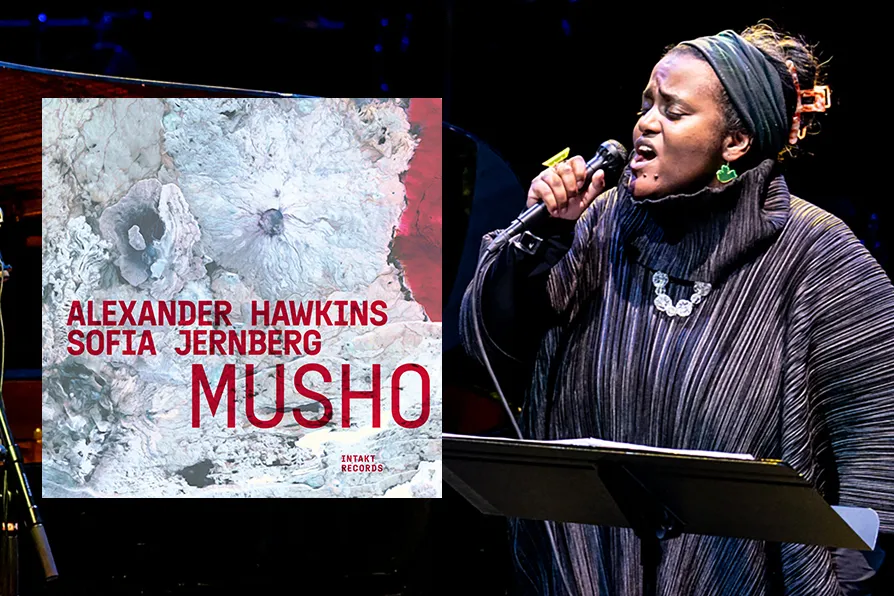GORDON PARSONS applauds a marvellous story of human ingenuity and youthful determination, well served by a large and talented company
CHRIS SEARLE speaks to Ethiopian vocalist SOFIA JERNBERG

 Sofia Jernberg, Musho Live [Pic: Tessa Veldhorst & Musical Utopias]
Sofia Jernberg, Musho Live [Pic: Tessa Veldhorst & Musical Utopias]
PERHAPS it was her childhood experiences that have made the Ethiopian singer Sofia Jernberg such a powerful and audacious musical internationalist. Her new album, Musho, allied with the brilliant and empathetic Oxford-born pianist Alexander Hawkins, has songs from Ethiopia, Armenia, medieval Sweden and Shakespearian England. And she states with pride that her artistry “stems from having grown up in two countries that defeated the West: Ethiopia and Vietnam.”
“I was born in Addis Ababa in 1983 and grew up with a single mother who adopted me while she was working as a diplomat in the Swedish embassy. She worked in Ethiopia and Vietnam before we arrived in Sweden when I was 10, when she started work at the Swedish International Development Agency. We had an electric piano and record player at home and I listened to music from all over the world. The LP player became my best friend. I was constantly singing, but never thought it could be a profession until I was in my mid-teens.”
“I speak four European languages well, but understand many more. My mother spoke Amharic and loved Ethiopia, so it has always been a part of my life, but its culture for me was always connected to a deep sorrow and involuntary separation. Ethiopia went through a lot in the ’80s and ’90s, and we engaged closely with that.
“I didn’t know what jazz was until my teenage years. Before that my interest was Western classical music. But I was always curious about all kinds of music, and as I looked at jazz shelves in libraries and record stores that curiosity deepened. I struggled to understand it, did all the listening to myself and never talked to anyone about it. I went to jazz concerts and avant-garde performances by myself, never talking to anyone about it. I never studied music at a higher level, but learned what I needed — how to read and write music and learned by doing, listening to and playing records of musicians I admired.
“I didn’t become a full professional singer until I was 30, but had stood on a stage and sung regularly since I was 10, since I went to choir school.”
She developed a love of many art forms, including dance and visual performance. “I chose music because it’s a language in itself. It brings people together and unites us in a strange way. I sing with people who often have opposite views to myself, who are twice my age and who I would never meet otherwise. All the ugly social structures go away when we make music. I’m a musician rather than a singer, and I sing without words for a whole concert to achieve that. Words can sometimes get in the way, and singing without them means that everyone, regardless of language, can access what I sing.”
What about her partnership with the protean Hawkins?
“We met when the musical director of Bimhuis, the Netherlands jazz club, put us together. I love Alex’s ambition, dedication and creativity in his life of music and piano, constantly pushing himself, always evolving and surprising me with the most magical moments. His musical knowledge is very rich and we share a love for all kinds of music, which is why I so often learn something new or different, because of something he said.”
Why is the album called Musho?
“It means ‘sad song’ in Amharic, and it was clear from the start that we would play melancholic music. My favourite track on the album is Willow, Willow, Desdemona’s lament from Othello. I was so pleased that Alex wanted to play something English, for the English music tradition connects us and has given me so much.”
Musho exemplifies the gloriously syncretic power of jazz, and Hawkins’s always surprising pianism unites with Jernberg’s voice in a brotherly musical fellowship to her surging, saddening and always deeply moving voice. When she sings the traditional Ethiopian song, Adwa, remembering the victory of Ethiopian forces over the invading Italian army in 1896, there is both a defiance and soulfulnness in her voice that eclipses all genres.
In that sense her voice embodies the cosmopolitan spirit of Robeson, Makeba, Peggy Seeger, Woody Guthrie and Nina Simone, and has a global reach which sings for all humanity.
Musho is released by Intakt records

Chris Searle speaks to saxophonist XHOSA COLE and US tap-dancer LIBERTY STYLES












